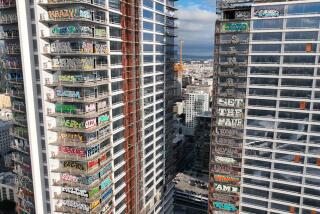Official Paints a Dark Picture for Newport Interstate’s Investors
- Share via
Although its owner says everyone’s money will be returned, Newport Interstate Properties Inc. is bereft of cash, and loans on about half the property bought with $30 million of investors’ money either are delinquent or soon will be, an aide to Newport’s bankruptcy trustee said Thursday.
Robert P. Mosier, a consultant to the court-appointed trustee named last month to oversee Newport’s affairs, said that the trustee’s team so far has found that mortgage payments on about half of the 16 projects still in Newport’s hands are delinquent. “And the other half are going delinquent because there’s no money to pay for them,” he said.
Up to 14 other projects were apparently sold by the company sometime before it entered bankruptcy.
While it is still too early to estimate how much money Newport Interstate investors eventually will get back, “the national average is 11 cents on the dollar,” Mosier said. Because bankruptcies move at a snail’s pace, he added, investors won’t collect a dime for at least a year and perhaps as long as three years.
And Jeffrey M. Howard, an attorney for a group of disgruntled investors, estimated Thursday that up to 1,200 investors who put $30 million into Newport Interstate “will get 10 cents to 20 cents on the dollar--if they’re lucky.”
The Newport Beach-based real estate investment firm’s troubles surfaced last month when worried investors began complaining that up to $20 million of the funds placed with Newport to pay for about 30 projects was missing.
In separate lawsuits against the company and its key officers, the investors said they each put up $75,000 to $250,000 to buy into real estate syndications--interests in partnerships that would own projects or parcels in Arizona, Texas and the Southern California communities of Buena Park, Palm Springs and Victorville.
But land that should have been developed remained vacant and Newport Interstate’s president, Richard J. Lorenat, borrowed heavily against much of the property without first notifying investors, the suits said.
On July 27, the firm voluntarily agreed to reorganize under federal bankruptcy laws and was taken over by the court-appointed trustee.
The Securities and Exchange Commission on Monday sued Newport and its three top officers for securities fraud, alleging there had been “commingling, misuse and misappropriation of investor funds.”
The officers--Lorenat, Vice President Michael Joyce and Controller Kenneth L. Shattuck--have temporarily agreed to an order forbidding them from future violations of securities laws. A similar, permanent consent decree affecting the company is expected to be filed soon by the SEC, an agency source said Thursday.
Earlier this week, Lorenat denied “any and all allegations” and insisted that Newport has “more than enough equity” to repay investors “100% of their investor dollars.”
But those looking into Newport’s fiscal status aren’t nearly as optimistic.
Mosier acknowledged Thursday that Lorenat and others at Newport are cooperating and “recognize what’s right and wrong. It seems to have sunk in that they can’t commingle moneys anymore.”
But so far, the team that has been scrutinizing Newport’s books has found that assets “do not equal 100 cents on the dollar,” Mosier said.
While he cautioned that the team has not finished its review, Mosier said the trustee so far “has identified 16 projects”--including a business park, coin laundries, strip centers and two apartments houses--that Newport started as investment opportunities and in which the investors may still have some equity. Of those, just four are revenue-producing projects, Mosier said.
The 16 projects also seem to be all that remain from about 30 projects that Newport had initiated since it began offering syndicated interests or tenancies in common in 1980, Mosier said.
Lorenat has defended the projects, saying that just four were expected to produce regular income for investors.
That claim, however, has been disputed by investors. Mosier said that he does not know what Lorenat and his company promised but added that “it appears that at some point in the future, there was some ultimate revenue-producing aspect” for most of the projects.
Mosier also contradicted Lorenat’s reported estimate that Newport is just $2 million to $3 million in debt.
But that calculation is based on selling each property for its full appraised value and does not make allowances for brokerage commissions, loan delinquency penalties and other potential costs, Mosier said.
“Anytime the word gets out that you’re dealing with distressed properties, the wolves move in and try to bid them down,” he said.
That is one reason it will take at least a year to liquidate Newport’s remaining parcels, Mosier said: “You don’t want a fire sale. This one could take a while.”
More to Read
Inside the business of entertainment
The Wide Shot brings you news, analysis and insights on everything from streaming wars to production — and what it all means for the future.
You may occasionally receive promotional content from the Los Angeles Times.










